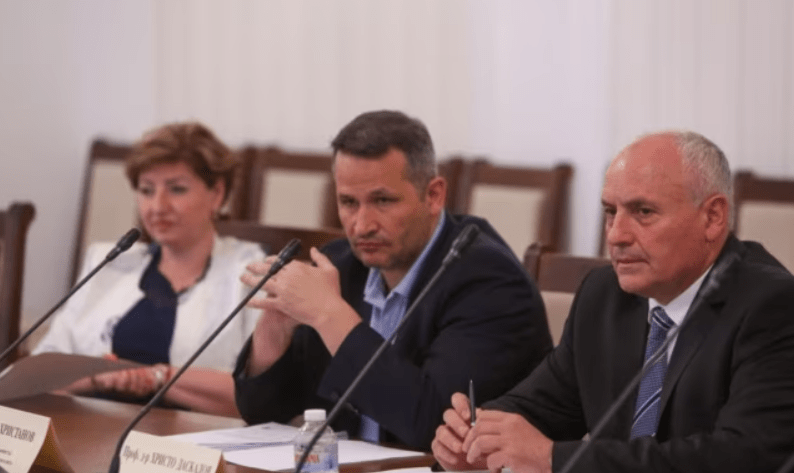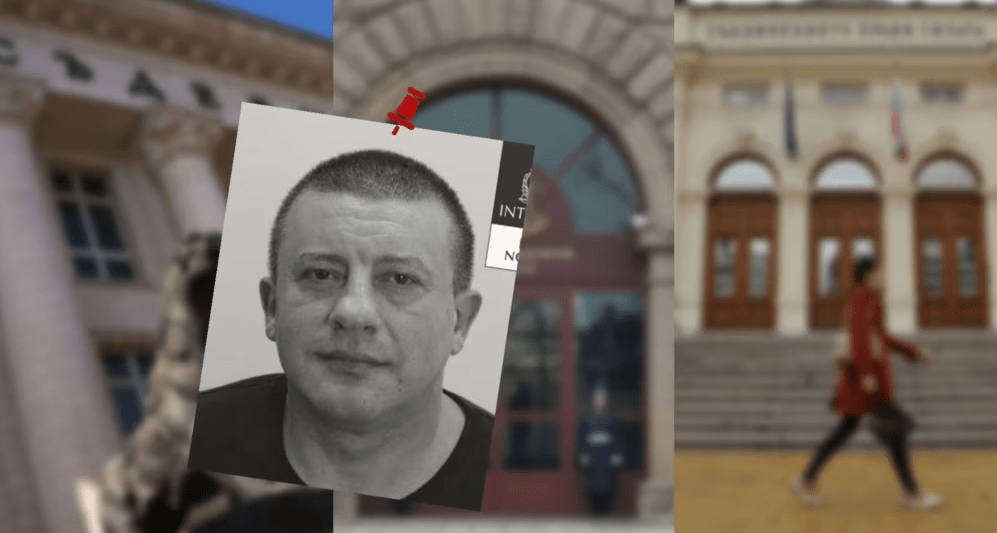He was one of Bulgaria’s most notorious mafia kingpins, who rose through the ranks in the chaotic 1990s, acquiring along the way an empire of businesses — some legitimate, many not — from fruit markets, parking lots, to a stake in a business at a key border crossing serving as a gateway to the European Union.
But as is often the fate of those operating in the underworld, Krasmir Kamenov met a violent end.
Kamenov, also known by his nickname of Kuro, was found shot dead along with his wife and two others in their home in a suburb of Cape Town early on May 25, police reported. No suspects have been detained or questioned and no possible motive was given.
Kamenov had reportedly been living in South Africa for years, although details of his life there — even including photos of him — are scant. But in the weeks before his death, Kamenov hit the headlines again, in connection to the disappearance of a cryptocurrency queen and an alleged plot against the country’s prosecutor-general. And since his death, there has been widespread speculation that Kamenov was killed because he knew too much about the ties between organized crime and Bulgarian elites — and, crucially, was about to speak out.
In March, prosecutors in the Bulgarian capital, Sofia, charged him with ordering the murder of a police officer in a bizarre case involving Ruja Ignatova, a vanished cryptocurrency queen who fled Bulgaria years ago after bilking gullible investors of billions. Even Interpol issued a worldwide “red notice” for Kamenov’s arrest.
Around the same time, Kamenov was also fingered by the country’s top prosecutor in what he claimed was part of a plot against him and the Bulgarian Interior Ministry. Prosecutor-General Ivan Geshev, who himself faces strong suspicions — including in Brussels and Washington — that he is less than eager to root out graft in one of the EU’s most corrupt members, later claimed he had escaped a car bombing, even though his accounting of events didn’t appear to exactly jibe with what appeared to have happened.
While few doubt that Kamenov had his enemies, his death has sparked speculation as to why now? For reporters at Bulgaria’s Bureau of Investigative Reporting and Data (BIRD), the timing was no accident, claiming he was about to divulge details to U.S. investigators about the mysterious fate of cryptocurrency queen Ignatova.
Others suspect what Kamenov knew could have proved damaging to political elites.
“What’s interesting is how people who for the last 20 years were only ‘urban legends’ suddenly became headline news,” Miroliuba Benatova, an award-winning investigative journalist who has covered Kamenov and organized crime, recently told RFE/RL’s Bulgarian Service. “Information about how Kuro is a suspect and maybe accused of organizing five murders, suddenly started to appear. It’s as if this man was protected from all that until now.”
The Sofia City Prosecutor’s Office on March 27 charged Kamenov with organizing the murder of former policeman Lyubomir Ivanov, who was killed in March 2022.
Following his killing, allegedly damning documents were discovered in Ivanov’s personal safe at his home. Those papers allegedly exposed a plot to kill the infamous Ignatova, who was head of the multimillion-dollar OneCoin scam. She vanished in 2017 after allegedly ripping off investors to the tune of $5 billion. The documents reportedly found in the possession of Ivanov indicated that Ignatova had been killed in 2018. The papers are also said to have linked the plot against Ignatova to a Bulgarian drug lord, who was alleged to be a former key associate of Kamenov from the 1990s.
The alleged documents — said to be official police reports — were the basis of an in-depth investigation by BIRD that claimed Ignatova was killed on a yacht in the Ionian Sea. Her whereabouts, let alone death, have yet to be officially confirmed, however. Adding to the confusion, Ignatova is one of the FBI’s most-wanted fugitives, the only woman on the list at this time.

According to BIRD, the timing of Kamenov’s killing was no accident. In a post on Twitter on May 26, BIRD said Kamenov had been their “source” for the police reports on the alleged murder plot and “was about to say more to U.S. investigators.”
Kamenov was again in the spotlight in March when Geshev, the prosecutor-general, accused journalists of conspiring with criminals, business owners, and politicians to plot against him and high-ranking officials at the Interior Ministry. Kamenov was one of those named by Geshev in his rambling rant.
Geshev is no stranger to controversy. He has long been accused by Brussels and Washington of turning a blind eye to much of the corruption in Bulgaria, refusing to open probes into some of the more egregious cases.
Kamenov’s business interests were murky as they were widespread. He and his various partners allegedly held stakes in multiple businesses, from parking lots to a fruit market and a bathhouse in Sofia. More worrying for Brussels was his part in the alleged mob takeover of a key border crossing with Turkey, where importers have reportedly been extorted for years.
In 2022, Prime Minister Kiril Petkov, who rose to power on a pledge to root out entrenched corruption in Bulgaria, vowed to put a stop to the suspected mafia shakedown at the Kapitan Andreevo checkpoint on the border with Turkey, a notorious entry point for drugs into the European Union, and where food items destined for EU markets were reportedly cleared without proper checks. For the criminals cashing in, the border crossing was known as a golden goose.

Kamenov was alleged to have a stake in a contract to disinfect vehicles at the checkpoint, a state requirement for all cars and trucks, and was reportedly tied to a private laboratory that tested all food imports from Turkey.
Ivan Hristanov, the deputy agriculture minister under Petkov, was tasked with cleaning up the operations at the notorious checkpoint. In June 2022, a day after the minister requested files on operations at Kapitan Andreevo, he received threats. “There was this message from the mafia guys,” he said in an interview with Politico in June 2022. “It was like a question: ‘Would it be a war with you? Or we’ll have peace?'”
Hristanov told Bulgarian media at the time that he feared for his and his family’s lives.
Kamenov rose to prominence in the 1990s, when Bulgaria, like much of former communist Eastern Europe, was gripped by instability as it struggled to transition to a free society after decades of authoritarian rule. He was allegedly a member of a hit squad run by VIS, a protection racket under the guise of a security firm that was owned by Vassil Iliev, an infamous Bulgarian organized crime kingpin who reportedly ran multiple criminal enterprises and was allegedly involved in the illegal drug trade.
Iliev was killed in Sofia on April 25, 1995, when unidentified gunmen sprayed his Mercedes-Benz with gunfire. After his death, Kamenov rose even faster up the ranks of VIS, eventually taking control of much of its assets, according to Nikolay Stoyanov, a Bulgarian investigative journalist at Kapital weekly in comments to RFE/RL’s Bulgarian Service.
In time, Kamenov and his alleged drug-lord associate expanded their empire, taking effective control of hotels, parking lots in Sofia, beach concessions, and the Slatina fruit and vegetable market, a sprawling complex in the capital near the city’s main airport. However, about a decade ago, a fallout between Kamenov and his close criminal associate began to emerge, Stoyanov says.
“This partnership worked relatively smoothly for several years, until at some point, sometime around 2019, Kuro’s confidants, whom he literally appointed to manage parts of his legal businesses in Bulgaria…began to betray him one by one…. And so [Kamenov] starts to lose control,” including, according to Stoyanov, of the operations at the Kapitan Andreevo border checkpoint.
To investigative journalist Benatova, Kamenov’s death could have been part of a “settling of accounts.”
“The entire political elite and the elite of the judicial system have shown very clearly that these people who are from…organized crime, then whitewashed their business, are intertwined,” she said.
“So, if there is a mafia war, it is already of a mafia that has merged much more with the state and it is already an intrastate war,” Stoyanov added. “Not just underground clans, but at a higher level, of people who occupy quite high positions in the state.”

